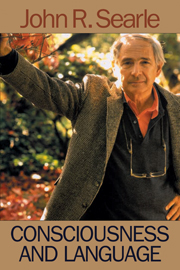Book contents
- Frontmatter
- Contents
- Introduction
- 1 The Problem of Consciousness
- 2 How to Study Consciousness Scientifically
- 3 Consciousness
- 4 Animal Minds
- 5 Intentionality and Its Place in Nature
- 6 Collective Intentions and Actions
- 7 The Explanation of Cognition
- 8 Intentionalistic Explanations in the Social Sciences
- 9 Individual Intentionality and Social Phenomena in the Theory of Speech Acts
- 10 How Performatives Work
- 11 Conversation
- 12 Analytic Philosophy and Mental Phenomena
- 13 Indeterminacy, Empiricism, and the First Person
- 14 Skepticism About Rules and Intentionality
- Name Index
- Subject Index
10 - How Performatives Work
Published online by Cambridge University Press: 14 January 2010
- Frontmatter
- Contents
- Introduction
- 1 The Problem of Consciousness
- 2 How to Study Consciousness Scientifically
- 3 Consciousness
- 4 Animal Minds
- 5 Intentionality and Its Place in Nature
- 6 Collective Intentions and Actions
- 7 The Explanation of Cognition
- 8 Intentionalistic Explanations in the Social Sciences
- 9 Individual Intentionality and Social Phenomena in the Theory of Speech Acts
- 10 How Performatives Work
- 11 Conversation
- 12 Analytic Philosophy and Mental Phenomena
- 13 Indeterminacy, Empiricism, and the First Person
- 14 Skepticism About Rules and Intentionality
- Name Index
- Subject Index
Summary
The notion of a performative is one that philosophers and linguists are so comfortable with that one gets the impression that somebody must have a satisfactory theory. But I have not seen such a theory and in this essay I want to address the question: how exactly do performatives work? I believe that answering that question is not just a fussy exercise in linguistic analysis but can give us insights into the nature of language and the relation between speech acts and actions generally. Some people who have written about performatives seem to think that it is just a semantic fact about certain verbs that they have performative occurrences, but the puzzle is: how could any verbs have such remarkable properties just as a matter of semantics? I can't fix the roof by saying, “I fix the roof” and I can't fry an egg by saying, “I fry an egg,” but I can promise to come and see you just by saying, “I promise to come and see you” and I can order you to leave the room just by saying, “I order you to leave the room.” Now why the one and not the other? And, to repeat, how exactly does it work? Perhaps the most widely accepted current view is the following: performative utterances are really just statements with truth values like any other statements, and Austin was wrong to contrast performative utterances with some other kind. The only special feature of the performative statement is that the speaker can perform some other speech act indirectly by making the statement.
- Type
- Chapter
- Information
- Consciousness and Language , pp. 156 - 179Publisher: Cambridge University PressPrint publication year: 2002
- 1
- Cited by



